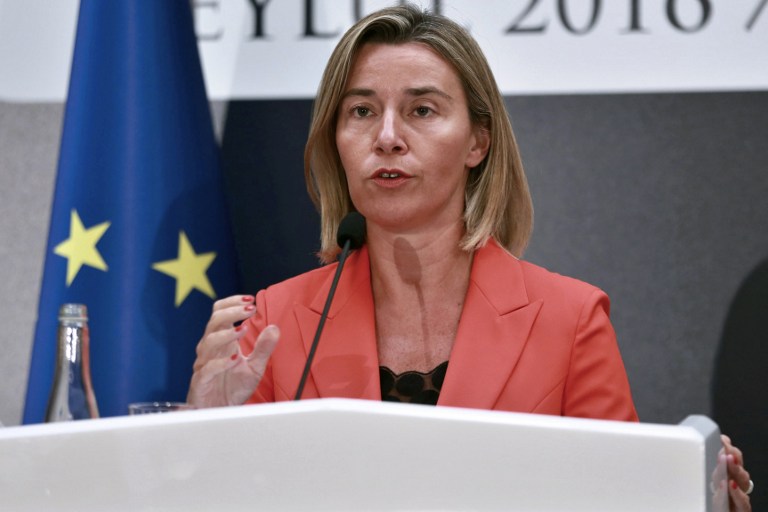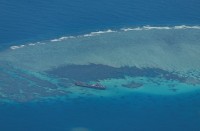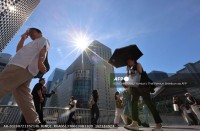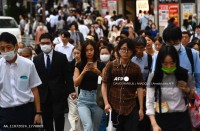
Turkey and the European Union on September 9, 2016 agreed to douse tensions that had darkened Ankara’s prospects for joining the bloc in the wake of the failed July 15 coup.EU foreign policy chief Federica Mogherini and Enlargement Commissioner Johannes Hahn — making the highest-level EU visit to Turkey since the coup — said that new chapters in Ankara’s long-running accession process should be opened and visa liberalisation was still on the table.
/ AFP PHOTO / ADEM ALTAN
ATHENS, Greece (AFP) – by John HADOULIS Sabine WIBAUX
Southern EU leaders on Friday sought to close ranks on migration, extremism and austerity with the bloc’s future on the line, and ahead of a showdown with hardliners next week.
Bringing together the members worst hit by the EU’s twin recession and refugee crises, the mini-summit will focus on “protecting borders, fostering growth, fighting against immigration… and acting together against terrorism,” French President Francois Hollande said at the meeting’s start.
The host, Greek Prime Minister Alexis Tsipras, told news site Euractiv ahead of the seven-nation huddle: “Europe’s Mediterranean countries can and must raise their voice.”
With Italian Prime Minister Matteo Renzi in attendance, the gathering comes less than two weeks after rescuers saved a one-day record of 6,500 migrants making the perilous journey across the Mediterranean to Europe.
“It is now common knowledge that Europe is at a critical crossroads,” Tsipras said.
“Economic stagnation, social cohesion problems, the rise of Euroscepticism and isolationism, the strengthening of far-right populist phenomena, are issues that we cannot bypass.”
The four-hour conclave is a chance to craft a common platform ahead of a major summit in Bratislava next month to chart the union’s post-Brexit future.
The 27 EU leaders — the entire bloc, except Britain — will gather September 16 to discuss the fallout from the British vote in June to quit the EU.
The so-called Visegrad group — made up of Hungary, Slovakia, the Czech Republic and Poland — has demanded a tougher EU stance on migration.
“Visegrad countries cannot be allowed to dominate the debate on Europe’s future,” Tsipras said in an interview with French daily Le Monde on Friday.
The leaders of Portugal, Malta and Cyprus are also present, though Spain’s acting Prime Minister Mariano Rajoy skipped the meeting amid desperate efforts in Madrid to form a coalition government.
A showdown is expected in Bratislava, with the Visegrad four already holding their own meeting in June to present a united front.
German Finance Minister Wolfgang Schaeuble was not optimistic over the impact of the gathering, which some have derisively termed “Club Med”.
“When socialist party leaders meet nothing terribly intelligent comes out of it most of the time,” he told reporters.
Manfred Weber, head of the European People’s Party, the largest in the European Parliament, was even more scathing.
‘Little games’
“Alexis Tsipras is once again playing the little games he knows so well,” Weber said, an apparent reference to the leftist leader’s attempts to build an anti-austerity alliance last year.
“What Europe needs right now is a message of unity, not new efforts to divide it,” he added.
A day earlier, Tsipras once again hit out at Germany’s perceived domination of the EU.
“We must collectively agree if we are a European Union or a German Union,” he told Le Monde.
Tsipras, an anti-austerity champion who says the fiscal straitjacket favoured by Germany will never permit weak economies such as Greece’s to recover, is also trying to swing more EU states to his vision.
The EU stability pact, whose budget deficit limits are already tested by France, Italy, Spain and Portugal, “is not the word of God, but rules we have agreed to and must improve”, Tsipras told Le Monde on Thursday.
Even so, Friday’s meeting is unlikely to bang the austerity revision drum too loudly to avoid antagonising Berlin, which has otherwise proven very sympathetic to southern states on migration.
More than 850,000 people — most of them fleeing conflict in war-ravaged Syria, Iraq and Afghanistan — arrived on the Greek islands last year alone after risking their lives on unseaworthy boats and dinghies.
“We need to reach a European asylum system that is realistic and shows solidarity, instead of shifting the burden to entry states,” Greece’s junior foreign minister for European affairs, Nikos Xydakis, said in an interview with AFP.
Human Rights Watch called on Greece Friday to end the detention of migrant and refugee children, pointing to “cramped and filthy conditions.”
Greek authorities registered more than 3,300 unaccompanied asylum-seeking and other migrant children who arrived in Greece in the first seven months of 2016, HRW said.








